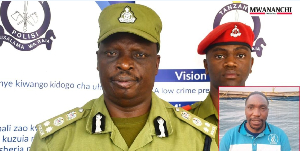General News of Saturday, 31 August 2019
Source: ghanaiantimes.com.gh
Improving service delivery is a collective responsibility - SNV
Mr Eric Banye, the Country Programme Coordinator, SNV Netherlands Development Organisation, has reiterated that improving service delivery is a collective responsibility.
He said the government, civil society organisations (CSOs), the private sector, donors, policy-makers, individuals and the media all had a role to play in ensuring efficient service delivery for the good of the nation.
He said in Ghana poor service delivery was still a challenge especially in the areas of Energy and Water, Sanitation and Hygiene (WASH).
Speaking to the Ghana News Agency on the sidelines of the SNV's Voice for Change (V4C) partnership Learning Event at Sogakope in the Volta Region, Mr Banye said they were extremely happy about how far they had come with the successful implementation of the project.
He noted that the V4C partnership project was building the capacity of the CSOs to be able to influence service delivery at the district, regional and national levels.
The V4C is an evidence-based advocacy programme being implemented by the SNV in partnership with the International Food and Policy Research Institute (IFPRI) and the Dutch Ministry of Foreign Affairs.
The Dutch Ministry is funding the programme for the period 2016 to 2020 as part of its worldwide effort to reinforce space for CSOs worldwide.
The programme is focused on four thematic areas - Food and Nutrition Security, Renewable Energy and WASH.
It seeks to ensure an increase in equity and fcoess to sustainable, equitable and affordable Sanitation and Hygiene services and products.
Mr Banye said the objectives of the V4C Learning Event were to deepen insights into the achievements of the project.
He said it was to generate ideas regarding capacity development, evidence generation and dissemination and advocacy.
Mr Banye said the five-day meeting was also to prepare for the close-up phase in 2020 and a possible phase II.
He said basically the essence of the five-day conference was to reflect on the challenges, which were affecting the project implementation over the past four years.
Mr Banye said the V4C Project was based on the three implementation pillars: Capacity Development, Evidence Generation and the Advocacy Activities.
He noted that through the capacity development, they were able to build the capacity of the 12 CSOs implementing the project in 28 districts to increase their leadership skills, their organisational sustainability, their thematic knowledge on the issues and also their advocacy skills.
In the area of evidence generation, Mr Banye said the SNV in partnership with IFPRI generated several evidence and supported CSOs to used the evidence effectively to do advocacy.
"Now when you come to the contents of advocacy, these CSOs have been able to make significant improvements in the districts by increasing the commitment of their policy-makers, by ensuring collaboration of the activities they do, by ensuring an increase in budgetary location and also influencing the agenda of the discussion around the assemblies," he said.
"So, in terms of this areas, I must say that we have made a significant improvement to the point that even if we end the programme in 2020, we will have these CSOs, without funding to be able to continue doing advocacy."
He said under the V4C partnership project they have been working in the areas of food and nutrition security, the post-harvest losses and related issues, cleaning cookings, mini-grids and sanitations.
Mr Banye said in most of the districts the implementing the project, the CSOs have been able to ensure that the medium-term development plans had sufficient budgetary provisions to address these issue.
He said the CSOs were able to influence the district assemblies to pass sanitation bye-laws.
With regards to post-harvest losses, the Country Programmes Coordinator said, they were working to ensure that farmers have access to post-harvest losses technologies, as part of efforts to provide support for the reduction of post-harvest losses.
On malnutrition, Mr Banye said they were ensuring that coordination of activities were improved at the district levels to address malnutrition; adding that "we are ensuring that we increase private sector participation".
"We are ensuring that communities play a key role in demanding for improved service at the assembly level."
Mr Banye lauded the Ghanaian media for the pivotal roles they had being playing in the execution of the V4C partnership project.












